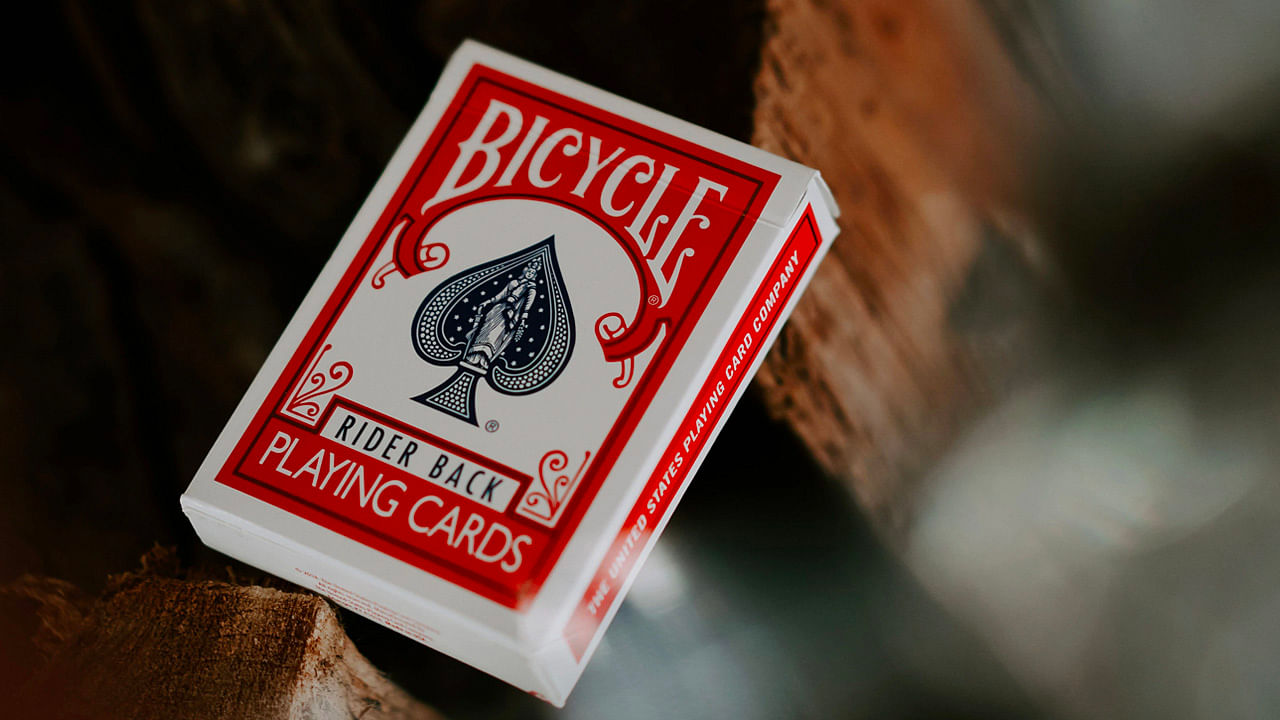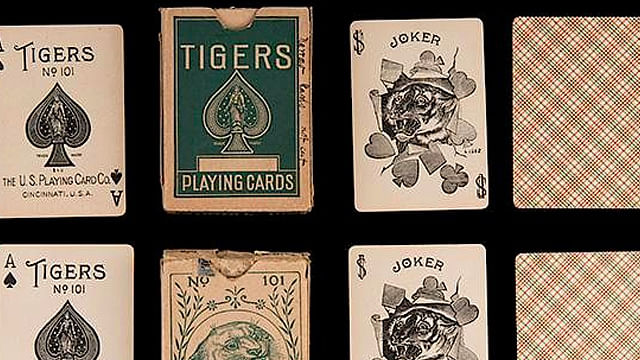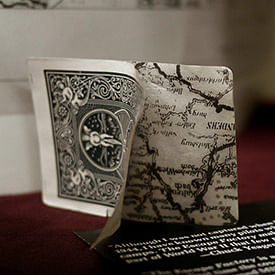How the USPCC Became One of the Biggest Companies You’ve Never Heard Of
Unless you’re a magician or poker player, the name UPSCC might not immediately ring a bell for you. However, we can almost guarantee you’ve used their products before. That’s because USPCC is actually a popular acronym for The United States Playing Card Company, the American company that brought playing cards into nearly every household in the world with the launch of their signature Bicycle Playing Cards.

If you close your eyes and think of a deck of cards, it’s likely going to be a deck of blue or red Bicycle Rider Back Playing Cards. That’s because, without a doubt, Bicycle Playing Cards are the most popular playing cards in the world. They are available almost everywhere and have been used for everything from playing the best card games to learning card tricks for more than 150 years.
Yet, there is so much more to the United States Playing Cards Company. Despite the fact they were founded almost 1,000 years after playing cards were used for the first time, their impact on how playing cards are made and distributed is truly unrivaled. So, join us as we dive into the fascinating history of the United States Playing Card Company.
What is the USPCC?
Best known for producing Bicycle Playing Cards, the USPCC is one of the largest manufacturers of playing cards in the world. They own many other iconic brands such as Bee and Tally-Ho, and have also produced countless stylish custom decks of cards and card game accessories like poker chips. Yet, they didn’t always make playing cards.
The United States Playing Card Company was founded in 1867 as the Russel, Morgan & Co. Printing Company. By 1881, they were already a printing juggernaut. However, it was a decision they made that year that would ultimately change the course of history and cement their place as one of the largest companies in the world.
Founder Colonel Robert J. Morgan recruited an aspiring and talented inventor from New York named Samuel J. Murray. Bursting with ideas, this young creator was wise beyond his years. His two-sided enameling machine and other patented inventions drastically increased production and reduced labor costs by nearly 70 percent. Riding this wave of success, the Russel, Morgan & Co. Printing Company decided to start printing its own playing cards in 1881.

The first deck of cards produced by Russel, Morgan & Co. Printing Company was Tigers Playing Cards (No. 101). These were followed by other popular playing card designs such as the Sportsman’s Playing Cards (No. 202), Army Playing Cards (No. 303), Navy Playing Cards (No. 505) and Congress Playing Cards (No. 404 and No. 606).
Yet, none of these would ever be as popular as Bicycle Playing Cards. It’s hard to believe, but the USPCC was actually in the playing card business for more than four years before Bicycle Playing Cards were introduced in 1885. Affectionately referred to as “bikes” by magicians, Bicycle Playing Cards catapulted Russel, Morgan & Co. Printing Company to unimaginable levels of success. They would eventually rename themselves the United States Printing Company and create an entirely separate brand known as The United States Playing Card Company (or US Playing Card Company).
Did You Know?

The USPCC has a long history of providing wartime soldiers with playing cards. In World War II, they even went as far as working with the U.S. Government to make top secret decks of cards with maps hidden inside the layers. If a soldier was taken as a POW, they could moisten the card and peel apart its layers to see the route needed to escape to freedom.
Read More Fun Facts About Playing Cards
What Companies Does The United States Playing Card Company Own?
Upon the launch of the USPCC brand, the company also began its most profitable expansion plan—acquiring smaller playing card manufacturers such as Standard Playing Card Company and New York Consolidated Card Company. This trend would continue for the entirety of their existence, bringing many household names under the United States Playing Card Company umbrella.
 Throughout its history, The United States Playing Card Company has overseen several well-known brands of playing cards including:
Throughout its history, The United States Playing Card Company has overseen several well-known brands of playing cards including:
Despite being owned by the United States Playing Card Company, these decks of cards continued to have their own unique branding. Even though they’re all mostly printed on the same high-quality Bicycle Playing Card Stock, many magicians and cardists are adamant about preferring one brand of playing cards over another.
That being said, there are some unique playing cards under the USPCC umbrella. For example, KEM Playing Cards specializes in creating playing cards with standard playing cards suits and symbols that are made from 100% plastic. These super durable cards were eventually adopted as the official playing card of the World Series of Poker.
Stud Playing Cards were once only available at Walgreens and were initially met with lukewarm reception. However, they built up a cult following from magicians. And, upon being discontinued, they became a hot item for collectors.
Collecting playing cards is a very popular hobby and avid collectors are always eager to get their hands on rare decks of cards like Stud Playing Cards or the original Jerry’s Nugget Playing Cards. These collectable rare playing cards often fetch prices on the secondary market. And there's even a whole industry dedicated to properly storing playing cards and finding the best ways to display your playing card collection in an effort to make your playing cards last longer.

Cartamundi Buys the United States Playing Card Company
Throughout its lengthy history, the USPCC has also been the subject of some major acquisitions itself. The company was owned by a few different groups between 1969 and 1994 before having a brief return to self-ownership that was quickly followed by an acquisition from a company that would eventually become Newell Brands.
The USPCC and Newell Brands relationship lasted nearly three decades and led to significant growth and success—including a venture into the world of puzzles and board games via the Hoyle brand in 2012. In fact, one of the only rocky moments came in 2009 when the iconic USPCC Factory in Cincinnati was moved to Kentucky.
Despite being just a short trip across the river, this move was followed by a brief period of production issues that angered magicians and card players alike. Decks of cards produced by the USPCC between 2009 and 2012 experienced a significant amount of uncharacteristic production issues with both the design and quality. It was especially concerning that the playing cards, which were known for being easy to shuffle and fan thanks to a signature air-cushion finish, had a tendency to stick together.
Magicians, cardists, playing card collectors and gamblers, starting clamoring for a return to the quality they came to love from the USPCC’s Cincinnati factory (the ones with the iconic blue seal.) So much so, they would go out of their way to find Blue Seal Bicycle Playing Cards instead of the ones with the black seal (which would indicate they were made at the Kentucky factory). The production issues were eventually resolved and Bicycle Playing Cards are still the most popular in the world.

While the relationship with Newell Brands was one of the most steady in the history of the USPCC, all good things must come to an end. In June 2019, Newell Brands agreed to sell the United States Playing Card Company to Cartamundi. This Belgian playing card company was the biggest competitor to the USPCC and has its own fascinating history. Cartamundi purchased all USPCC properties, as well as the USPCC playing card manufacturing plant in Kentucky and satellite facility in Spain.
This transaction was completed fairly quietly in terms of mainstream news. But, it did cause quite a buzz in the magic community. Bicycle Playing Cards are considered some of the best playing cards for magic tricks and have been on the shelves of magic shops for as long as anyone can remember. Magicians were worried about the future of the Bicycle Playing Cards and trick decks they know and love. But, thankfully, the USPCC has continued to operate as normal as a subsidiary of Cartamundi.

